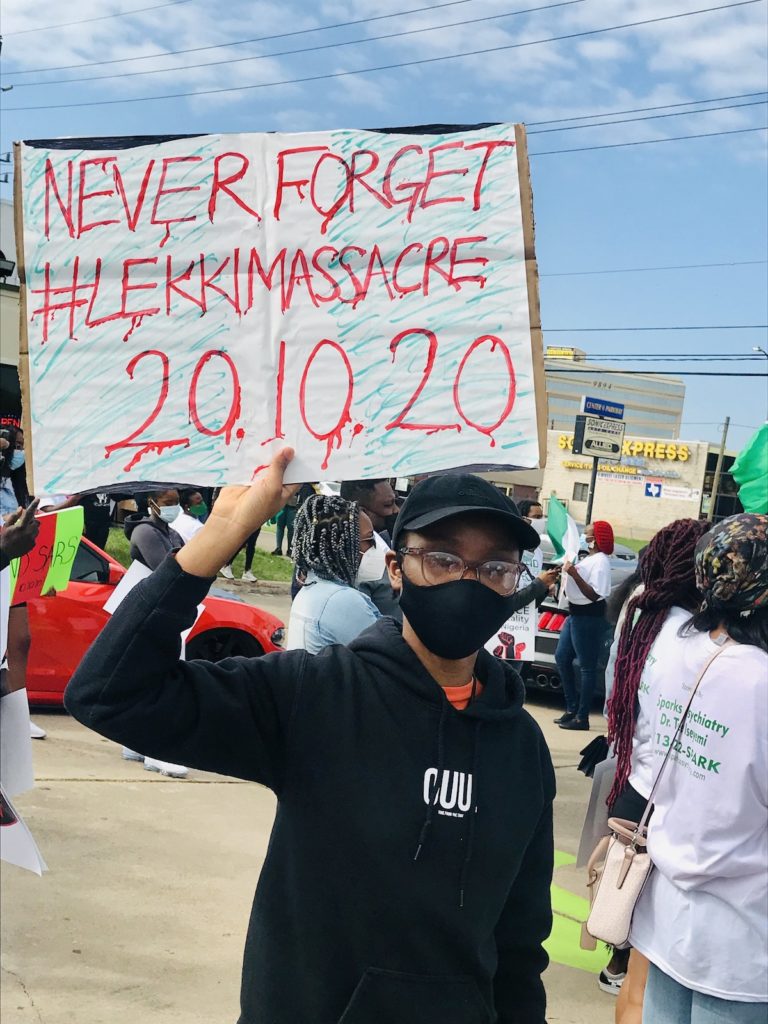Tens of thousands of Nigerian youths have taken to the streets of Nigeria over the past three weeks to demand an end to the Federal Special Anti-Robbery Squad. What began as a call for the elimination of the special police unit, whose members wear plain clothes and drive unmarked cars, has grown into a mass movement against all forms of police brutality practiced by the Nigerian state. The movement has been met with violent force, beatings, tear gas, water cannons and even murder.
The #EndSARS mass movement kicked off in the streets on October 7 after a video went viral showing a man being brutally killed by officers in the southern Delta state. In response to the video going public authorities arrested not the officers who killed the civilian, but the bystander who filmed the killing. This further enraged the Nigerian public. According to Guardian correspondent Emmanuel Akinwotu, everyone in Nigeria has a SARS story. From the time SARS was formed in 1992 to combat armed robbery, kidnapping and violent crime, its officers were not required to wear uniforms or any form of identification. Over time they came to use this anonymity to carry out extrajudicial killings, torture and armed robbery, the very thing they were set up to combat. The viral video of the extrajudicial killing was just the latest in a very long line of atrocities committed by SARS.
Hundreds of young people took to the streets on October 8 and were met with violent force by the police. As the repression continued, what began as a call to end SARS morphed into an uprising against the Nigerian police state, with the movement spreading to 26 cities across the country. On October 11, Inspector General of Police Mohammed Adamu’s announcement that SARS would be disbanded was met with skepticism and disbelief, as this announcement had been made 5 times in the past with no results. Adamu added that SARS officers would be moved to other police units such as the newly-formed SWAT. This was unacceptable to the thousands of people in the streets who were demanding officers be held accountable instead of being moved elsewhere to commit further atrocities.
Lekki Massacre sparks outrage
Things took a dramatic turn on the night of October 20 when, several hours after a 24-hour curfew was announced, hundreds of protesters were at the Lekki toll gate in Lagos making their demands for change heard. Nigerian state security forces fired on young, peaceful protestors with live ammunition.
Demonstrators carried the green and white flag of Nigeria and sang the country’s national anthem. In the words of Fredrick Nwabufo writing in The Cable Nigeria, “The Nigerian flag has turned scarlet from being a sponge soaking up the living fluid of harmless citizens who thought that the murderers would respect the symbol of the nation and spare their lives… Young Nigerians who only ventured out with nothing but the flag, their fist and voice to protest against police brutality became victims of the violence they are campaigning against.” By the time the shooting stopped and the smoke finally cleared, 15 people reportedly lay dead.
Nigerians in the diaspora fight back
Using the hashtags #EndSARS and #LekkiMassacre, Nigerians spread awareness of what was happening across the globe. Outside of Nigeria, this movement resonated greatly in the city of Houston, Texas, home to the largest diaspora population of Nigerians in the United States. Since October 11, young Nigerians in Houston had been gathering in the hundreds outside various African markets throughout southwest Houston to march in solidarity with those taking part in the protests in their homeland, spread awareness, and raise funds for families of the affected. After news of the Lekki massacre reached Houston, some 400 Nigerians in the diaspora gathered on October 24 to decry the massacre and put the Nigerian government on notice that the whole world is watching. In the absence of a Nigerian embassy in Houston, protesters gathered at the Southwest Farmer’s Market parking lot where they raised their fists in unison and sang the classic trade union anthem “Solidarity Forever.” Christian and Muslim speakers alike condemned the leadership of Nigeria’s President Muhammadu Buhari and called for his immediate resignation.
From the market, hundreds of marchers took to the street and completely shut down eastbound traffic. Drivers passing in the opposite lane honked their horns and raised their fists in a show of solidarity. As they marched, protesters chanted “Buhari must go!”, “End SARS!”, “Enough is enough!” and “Buhari is a bad boy!” On the way back to the market, demonstrators stopped at one point to kneel in the middle of the street for a moment of silence for the 51 Nigerians killed by security forces since the uprising began.
From Houston to Lagos, the working class is demanding an end to the violence perpetrated against them by the police on behalf of the ruling class. It is only through the determination of the people united in the struggle that the ruling class feels pressured to concede to our demands. End police state violence in Nigeria and around the world. #EndSARS now!





